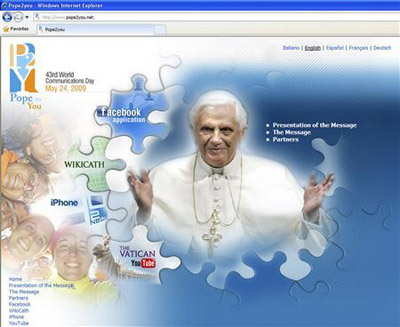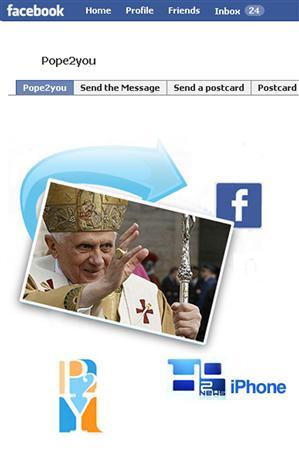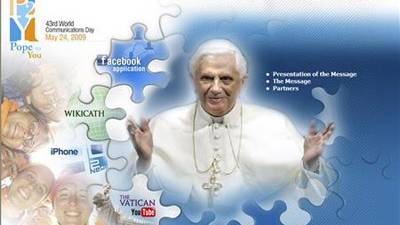Can You Poke the Pope on Facebook?
Source: abcnews.go.com

You can't officially friend him or forward photos of your most recent night out, but, as of Thursday, the Vatican says you can meet the pope himself on Facebook.

This week, the Vatican launched a new Web site, www.pope2you.net, to reach a younger generation of worshippers.(Jonathan Bainbridge/Reuters)
Launched to coincide with the Vatican's World Communications Day Sunday, the pope's new Facebook application, Pope2You, lets users send "virtual postcards" with photos and messages from Pope Benedict XVI to Facebook friends. Users can also listen to the pope's speeches through the new application.
The Vatican also launched a Pope2You Web site and an application for the iPhone and iPod Touch that gives users audio and video news of the pope's travels and speeches.
In a message posted on the new Web site, the pope said the theme for this year's World Communications Day is "New Technologies, New Relationships: Promoting a Culture of Respect, Dialogue and Friendship."
"In this year's message, I am conscious of those who constitute the so-called digital generation and I would like to share with them, in particular, some ideas concerning the extraordinary potential of the new technologies, if they are used to promote human understanding and solidarity.
"These technologies are truly a gift to humanity and we must endeavor to ensure that the benefits they offer are put at the service of all human individuals and communities, especially those who are most disadvantaged and vulnerable," he said.
Pope's New Site Is Latest Addition to Universe of Faith-Based Sites
Despite the Vatican's embrace of new technologies, the pope also issued a small caution.
"It would be sad if our desire to sustain and develop online friendships were to be at the cost of our availability to engage with our families, our neighbors and those we meet in the daily reality of our places of work, education and recreation," he said. "If the desire for virtual connectedness becomes obsessive, it may, in fact, function to isolate individuals from real social interaction while also disrupting the patterns of rest, silence and reflection that are necessary for healthy human development."
Earlier this year, the pope launched his own YouTube channel.
But the pope's latest foray into Facebook is just the latest addition to an ever-expanding universe of faith-based Web sites that are changing the way people worship.
"Religion in general, but Christianity, specifically, has always embraced technology," said Michael Kress, a managing editor at Beliefnet.com, one of the largest multifaith online resources. It has always been the case "to use the latest technology to deepen your faith, to share your faith," he said.
For the past few years, sites like Beliefnet, MyJewishLearning, Muslimspace and, yes, even FaithBook, have given people opportunities to learn about new faiths, deepen their devotion and forge religious communities not limited by geography.
Now, as the Internet continues to give worshippers unprecedented power to direct their own spiritual journeys, religious leaders have joined the social-networking stampede, too, and have started to change the ways they guide their congregations.
"I think we're just beginning to see [social networking] change the world and change faith," Kress said. There's "a huge amount of individual choice and individual decision-making that wasn't there a generation or so before. That aligns perfectly with the social-media phenomenon."
GodTube Becomes Global Faith-Based Network
Now that people can follow the sermons of a pastor or rabbi half a world away, or listen to a service on a Wednesday afternoon instead of a Sunday morning, the resulting communities aren't as dependent on pastors and churches, he said.
"The individual is really in control in a way they weren't in the past , in terms of what is meaningful and authentic to them," Kress said.
Recognizing that something akin to a religious revolution may be afoot, Jason Illian relaunched the video-sharing site GodTube (once the fastest growing Web site in the country) last month as Tangle.com, a global faith-based social-networking site.
Billed as a movement and not just a Web site, the company said it already has more than 500,000 registered users and more than 2 million unique visitors each month. Illian said more than 12,000 ministries (churches and other faith-based groups) have signed on as partners, including Focus on the Family, the Fellowship for Christian Athletes and Potter's House, one of the largest churches in the country.
"At the end of the day, church isn't about a building, it's about a community," Illian, CEO of Tangle, said. "This is a platform to build a community in very meaningful ways."
From the Mega Church to the 'Giga Church'
Much like FaceBook, Tangle lets members create pages of their own and then share videos, comments, photos and other content. But it also includes a Prayer Wall, which receives hundreds of thousands of new messages a day, and a virtual, interactive Bible on which members can comment and discuss.
Ministries can also create their own pages to communicate with members and have even given the offering plate a 21st century makeover.
"The whole concept of taking the plate and passing it around is our parents' generation," Illian said.
And, most importantly, now that people can easily reach and inspire through the Internet, new technology is changing the way influence works in religious communities, he said.
"Christendom is no longer led by a handful of the biggest ministries and the best-financed. It's going to be run by people who can touch other people's hearts in creative, viral and meaningful ways," he continued. "It's a complete paradigm shift. ... It's no longer a mega church. It's now a giga church."
Next-Generation Religious Leaders Adapting to Technology
Most of the leaders in Christendom don't know it's coming and, for them, it's "going to hit like a tsunami," Illian said.
But, he added, many of the next-generation leaders understand that technology is changing how religion gets done and are adapting appropriately.
Lifechurch.tv, for example, is a "multi-site church" that unites each week through a satellite broadcast from one of its pastors. It has 12 locations (or campuses) scattered across the country, but those who don't live near a physical campus can join the Internet Campus. The high-gloss, interactive Web site offers online seminars, member-written blog posts, video podcasts and an ongoing, countdown to the next virtual sermon.
Islamictube, Naseeb.com, Muslimsocial.com Reach Out to Muslim Community
Although other faith groups may not have a networking site as comprehensive as Tangle, they are also starting to adopt the new technology.
Sites like Islamictube, naseeb.com and muslimsocial.com cater to Muslim communities but religious leaders, particularly those who work with younger generations, use Facebook and other mainstream networks to communicate.
"I think that's a good thing," said Edina Lekovic, communications director for the Muslim Public Affairs Council. "I think that particularly in our community, we experience mosques, in the worst case scenario, that have lost touch. They're trying to do the same old tired Sunday school program."
But, she said, more forward-thinking mosques are creating Facebook pages for youth groups and posting sermons and schedules online.
"In some ways it creates competition in the marketplace," she said. "These days, you don't get off the hook."
Enough Virtual Life Already?
But while religious leaders are using new technology to recruit and reach out to members, some have a few reservations.
"I'm of a couple of minds about it," said Rabbi Howard Goldsmith of New York City's Temple Emanuel. "On one hand, in terms of communicating and teaching, I think they're vital tools. On the other hand, people look to authenticity and groundedness that is often elusive in cyberspace."
For him, Facebook is a great way to find people and let them know about temple activities. He'd even try Twitter if he could fit it in between all the rituals such as weddings, funerals and baby-naming services that call for a live rabbi.
But, ultimately, he said, Facebook isn't a substitute for face-time, especially in the Jewish faith, which has such a strong tradition of gathering in person. "There's so much virtual life out there already; people are looking for something real," he said.
As for InformationAgePrayer.com, the new Web site that automates prayer, he said, "I think that prayer is about heightening our awareness about the world around us and continuing to reinforce our relationship with God. And I don't think that having a computer recite our prayers for us accomplishes either of those goals."
James Clement van Pelt, program coordinator for Yale Divinity School's Initiative in Religion, Science and Technology, said churches that embrace the technology have found considerable success. But he and connected members of the clergy believe that even as technology changes the way people express their faith, virtual churches will never replace brick-and-mortar ones.
"People are always looking for guidance," van Pelt said. "When people have questions, they look for sources of guidance. I think that's not going to change."

Article from: Can You Poke the Pope on Facebook?






















